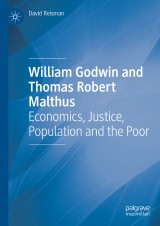Details
William Godwin and Thomas Robert Malthus
Economics, Justice, Population and the Poor|
128,39 € |
|
| Verlag: | Palgrave Macmillan |
| Format: | |
| Veröffentl.: | 01.07.2024 |
| ISBN/EAN: | 9783031621130 |
| Sprache: | englisch |
| Anzahl Seiten: | 300 |
Dieses eBook enthält ein Wasserzeichen.
Beschreibungen
<p>This book explores the lifelong dialogue between Thomas Robert Malthus and the libertarian anarchist William Godwin. Shedding light on important topics in the history of economic and political thought, it examines Godwin’s rejection of the new industrial order and his insights into a post-acquisitive, post-conflictual future. It shows that Malthus felt Godwin had neglected the ever-increasing pressure of population on scarce food and that control could not be superseded by automaticity so long as the productivity of the land was limited by the law of nature.</p>
<p>Godwin and Malthus situated their views on population in the broader context of individual choice, property rights, normative constraint and the status of the poor. Godwin and Malthus were committed to an economy that was equitable as well as efficient. Their proposals for social betterment make the book relevant to contemporary debates even as it sheds light on two giant thinkers of the past.</p>
<p>Godwin and Malthus situated their views on population in the broader context of individual choice, property rights, normative constraint and the status of the poor. Godwin and Malthus were committed to an economy that was equitable as well as efficient. Their proposals for social betterment make the book relevant to contemporary debates even as it sheds light on two giant thinkers of the past.</p>
<p>1. Introduction.- 2. The Individual.- 3. The State.- 4. Population.- 5. The Enquirer.- 6. The Continuing Debate.- 7. Malthus’ Essay.- 8. Godwin’s Thoughts.- 9. Of Population.- 10. The Westminster Review. 11. Conclusion.</p>
<p><strong>David Reisman</strong> is Professor Emeritus of Economics at the University of Surrey, UK, and Senior Associate at the Nanyang Technological University, Singapore.</p>
<p>This book explores the lifelong dialogue between Thomas Robert Malthus and the libertarian anarchist William Godwin. Shedding light on important topics in the history of economic and political thought, it examines Godwin’s rejection of the new industrial order and his insights into a post-acquisitive, post-conflictual future. It shows that Malthus felt Godwin had neglected the ever-increasing pressure of population on scarce food and that control could not be superseded by automaticity so long as the productivity of the land was limited by the law of nature.</p>
<p>Godwin and Malthus situated their views on population in the broader context of individual choice, property rights, normative constraint and the status of the poor. This book highlights Godwin and Malthus’ commitment to an economy that is equitable and efficient, making their ideas relevant to contemporary debates, and sheds light on two giant thinkers of the past.</p>
<p><strong>David Reisman</strong> is Professor Emeritus of Economics at the University of Surrey, UK, and Senior Associate at the Nanyang Technological University, Singapore.</p>
<p>Godwin and Malthus situated their views on population in the broader context of individual choice, property rights, normative constraint and the status of the poor. This book highlights Godwin and Malthus’ commitment to an economy that is equitable and efficient, making their ideas relevant to contemporary debates, and sheds light on two giant thinkers of the past.</p>
<p><strong>David Reisman</strong> is Professor Emeritus of Economics at the University of Surrey, UK, and Senior Associate at the Nanyang Technological University, Singapore.</p>
Provides insight into the overlooked dialogue between Thomas Malthus and William Godwin Highlights early debates on social attitudes towards poverty and the role of state intervention Shows the influence of Thomas Malthus and William Godwin on the history of economic thought


















